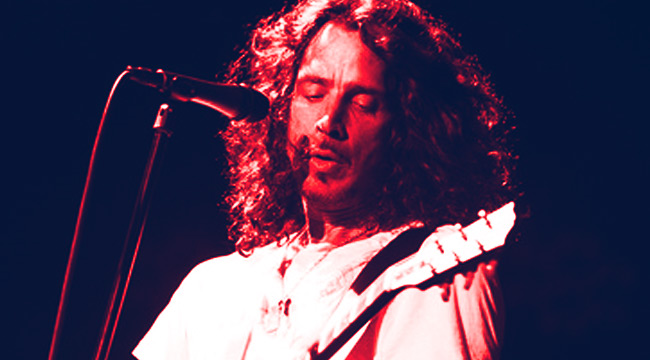
The machinations of grief in the midst of celebrity loss are a lot like personal grief with those stages that we all gravitate towards, though they’re a little different and occur in rapid succession while being timed to a news cycle that never seems to let us sit with a loss for too long.
It starts, of course, with the shock of it all. Whether young or old, vibrant and full of life or wasting away before our eyes, the death of a beloved artist always comes on like a violent squall because, to a degree, those people are frozen in our minds at the point of their greatest impact on us. When I think of Chris Cornell, even now, I think of a 29-year-old Cornell among the wheat and clouds beside Kim Thayil, Ben Shepherd, and Matt Cameron in the “Black Hole Sun” video, their stone seriousness in stark contrast to the smiling idiots that were watching the world burn.
Expression comes next. It has to. These things — with their infuriating and humbling frequency — create a wound that can’t be ignored and which needs to be bled. And the slight mood lifting magic of not feeling sh*tty about something in complete solitude turns the digital public square into an ideal place to do exactly that.
All over the world, people have turned on (and up) Soundgarden, gone down Youtube rabbit holes in search of old interviews and performances, and sporadically turned to Twitter. There, they’ve posted lyrics in tribute (“No one sings like you anymore” is an understandably popular option), reminisced about playing Badmotorfinger till the walls shook, reflected on the ferocity of Audioslave’s debut, and pitched Cornell and Soundgarden as the (sometimes under-remembered) true granddaddies of the Seattle Sound, or “grunge.”
But, of course, nostalgia isn’t the only thing fans indulge in during the hours and days following a loss like this. We’re all obsessing over grim and gut-shearing details as they trickle out. We’re all asking why this happened and we’re all searching for answers.
At some point on Thursday, I watched the video from Cornell’s last performance and tried to determine if he seemed out of it or flashed some other warning sign. I had to stop and go back to blaring Down On The Upside. The flirtation with grief-inspired sleuthing was too heavy for me, but that may not be typical. If sadness and frustration nudge you to investigate (and assign deeper meaning to) Cornell’s lyrics about death and dying and old social media posts in search of an answer that may never come, then do that. Whatever gets you through. Especially with this one, because it feels like it’s going to take a little while for this to sink in.
In the midst of a conversation about this loss, I told a friend that Cornell was my Bowie. And for a little while afterward, I thought that was an odd thing… to quantify my grief with a ranking. But there’s truth to it. I had deep affection and respect for Bowie, but nothing compares to the death of one of those tentpole figures from your youth. And that’s especially true when you were a 13-year-old with way too much anger and angst who felt a connection to “Fell On Black Days” and what sounded like someone who understood what heaviness and dark thoughts felt like. But we haven’t just lost a key artist from my (and maybe your) adolescence, we’ve gained the realization that we’ve nearly lost all of them.
In his poignant tribute to Cornell, Steve Hyden made an observation that has lingered in my mind. It’s one that has been true for years, but which was maybe less clear in the past thanks to the continuing presence of Cornell.
Kurt Cobain, Layne Staley, Scott Weiland, Shannon Hoon, and now Cornell — so many of that decade’s most towering rock singers are gone, robbed of the middle-age and senior years that the classic-rock heroes of the ’60s and ’70s have been afforded.
Kinda hits you like a hammer when you see it laid out. But it’s not just the human cost or the lost creative potential and years of theoretical music that we’re grieving. It’s that a lot of ’90s kids have been made into bastards by the loss of so many singers that were able to make that kind of connection with angsty teenagers, leaving a filter of sadness on top of songs that helped a lot of people beat back their own demons. And that taint is never going to go away.
Burying your heroes sucks, but it’s made so much worse when you look around, don’t really see anyone left, and feel the cold clutch of a brewing existential crisis. And to piggyback further on Hyden’s observation, that’s sort of exclusive to people who grew up in the grunge era and a reason why Cornell’s death is a little harder take. One of the many reasons, really. And so we grieve. For whatever good it does, in whatever way we choose to do it.






